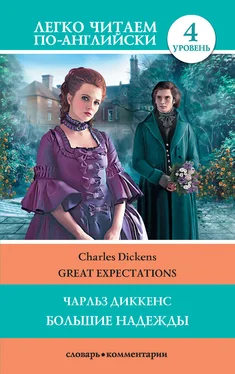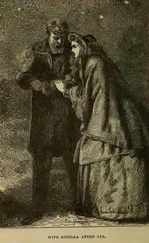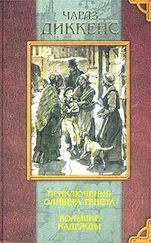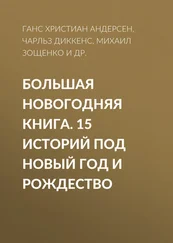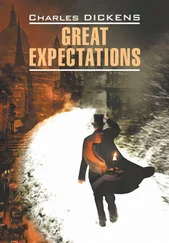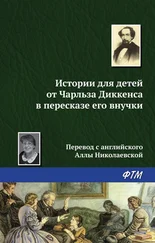“Quite my opinion,” said Drummle. “But don’t lose your temper. Haven’t you lost enough without that?”
“What do you mean, sir?”
“Waiter!” said Drummle, instead of answering me.
The waiter reappeared.
“Look here. You quite understand that the young lady doesn’t ride today, and that I dine at the young lady’s?”
“Quite so, sir!”
In the room where the dressing-table stood, and where the wax candles burnt on the wall, I found Miss Havisham and Estella; Miss Havisham seated near the fire, and Estella on a cushion at her feet. Estella was knitting, and Miss Havisham was looking on. They both raised their eyes as I went in.
“And what wind,” said Miss Havisham, “blows you here, Pip?”
“Miss Havisham,” said I, “I went to Richmond yesterday, to speak to Estella.”
I took the chair by the dressing-table.
“What I had to say to Estella, Miss Havisham, I will say before you. It will not surprise you, it will not displease you. I am very unhappy.”
Miss Havisham continued to look steadily at me.
“I have found out who my patron is. It is not a fortunate discovery, and is not likely ever to enrich me in reputation, station, fortune, anything. It is not my secret, but another’s.”
“Miss Havisham, you deeply wrong both Mr. Matthew Pocket and his son Herbert.”
“They are your friends,” said Miss Havisham.
“They made themselves my friends,” said I.
Still looking at me keenly, Miss Havisham asked:
“What do you want, then?”
“Estella,” said I, turning to her now, and trying to command my trembling voice, “you know I love you. You know that I have loved you long and dearly.”
She raised her eyes to my face.
“I should have said this sooner, but I refrained from saying it. But I must say it now.”
Estella shook her head.
“I know,” said I, in answer to that action – “I know. I have no hope that I shall ever call you mine, Estella. I am ignorant what may become of me very soon, how poor I may be, or where I may go. Still, I love you. I have loved you ever since I first saw you in this house.”
Looking at me perfectly unmoved and with her fingers busy, she shook her head again.
“It seems,” said Estella, very calmly, “that there are sentiments, fancies – I don’t know how to call them – which I am not able to comprehend. When you say you love me, I know what you mean, as a form of words; but nothing more. You address nothing in my breast, [219]you touch nothing there. I don’t care for what you say at all. I have tried to warn you of this; now, have I not?”
I said in a miserable manner, “Yes.”
“Yes. I can do no more.”
“Is it not true,” said I, “that Bentley Drummle is in town here, and pursuing you?”
“It is quite true,” she replied.
“That you encourage him, and ride out with him, and that he dines with you this very day?”
She seemed a little surprised that I should know it, but again replied, “Quite true.”
“You cannot love him, Estella!”
Her fingers stopped for the first time, as she retorted rather angrily, “What have I told you? Do you still think, in spite of it, that I do not mean what I say?”
“You would never marry him, Estella?”
She looked towards Miss Havisham, and considered for a moment with her work in her hands. Then she said, “Why not tell you the truth? I am going to be married to him.”
I dropped my face into my hands.
“I am going,” she said again, in a gentler voice, “to be married to him. The preparations for my marriage are making, and I shall be married soon.”
“Such a mean brute, such a stupid brute!” I urged, in despair. “O Estella! How could I see you Drummle’s wife?”
“You will forget me in a week.”
“You are part of my existence, part of myself. You have been in every line I have ever read since I first came here! You have been in every prospect I have ever seen since – on the river, on the sails of the ships, on the marshes, in the clouds, in the light, in the darkness, in the wind, in the woods, in the sea, in the streets! O God bless you, God forgive you!”
I held her hand to my lips some moments, and so I left her.
It was past midnight when I crossed London Bridge. The night-porter examined me with much attention. To help his memory I mentioned my name.
“Here’s a note, sir. The messenger said that you should read it immediately.”
Much surprised by the request, I took the note. It was directed to Philip Pip, Esquire, and on the top were the words, “PLEASE READ THIS, HERE.” I opened it, the watchman holding up his light, and read inside, in Wemmick’s writing —
“DON’T GO HOME.”
I drove to the Hummums [220]in Covent Garden. In those times a bed was always to be got there at any hour of the night.
What a doleful night! How anxious, how dismal, how long! There was a strong smell in the room of hot dust.
Why was I not to go home? What had happened at home? When should I go home? These questions were occupying my mind.
I had left directions that I was to be called at seven; for I decided to see Wemmick before seeing any one else.
“Halloa, Mr. Pip!” said Wemmick. “You did come home, then?”
“Yes,” I returned; “but I didn’t go home.”
“That’s all right,” said he, rubbing his hands. “I left a note for you at each of the Temple gates, on the chance. [221]”
I thanked him for his friendship and caution, and our discourse proceeded in a low tone.
“Now, Mr. Pip, you know,” said Wemmick, “you and I understand one another. We are in our private and personal capacities.”
I cordially assented. I was so very nervous.
“I heard there by chance, yesterday morning,” said Wemmick, “that a certain person – I don’t know who it may really be – we won’t name this person – ”
“Not necessary,” said I.
“ – Had made some noise in a certain part of the world where many people go. He disappeared from such place. I also heard that you at your chambers in Garden Court, Temple, had been watched, and might be watched again.”
“By whom?” said I.
“I wouldn’t go into that, [222]” said Wemmick, “it might clash with official responsibilities.”
“You have heard of a man of bad character, whose name is Compeyson?”
He answered with one other nod.
“Is he living?”
One other nod.
“Is he in London?”
He gave me one other nod.
“Now,” said Wemmick, “questioning is over. I went to Garden Court to find you; not finding you, I went to Clarriker’s to find Mr. Herbert. I did not mention any names. Mr. Herbert knows the house by the river-side, between Limehouse and Greenwich, [223]which is kept by a very respectable widow. It could be a house for our friend, right?”
Wemmick, having finished his breakfast, looked at his watch, and began to get his coat on.
“And now, Mr. Pip,” said he, with his hands still in the sleeves, “I have probably done the most I can do. Here’s the address. And let me give you some advice. Lay hold of his portable property. [224]You don’t know what may happen to him. Don’t let anything happen to the portable property.”
I soon fell asleep before Wemmick’s fire. When it was quite dark, I left.
I found the house very easily.
“All is well, Handel,” said Herbert, “and he is quite satisfied, though eager to see you. A curious place, Handel; isn’t it?”
It was a curious place, indeed; but remarkably well kept and clean.
In his two cabin rooms at the top of the house, which were fresh and airy, I found Provis comfortably settled. His coming back was a venture, he said, and he had always known it to be a venture.
Читать дальше
Конец ознакомительного отрывка
Купить книгу
